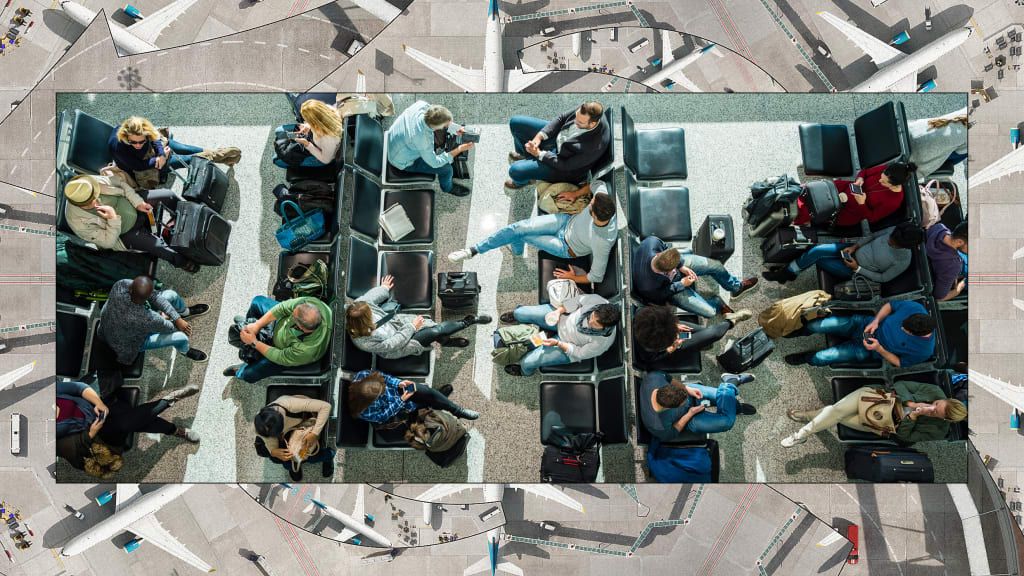It’s safe to say that air travel—especially holiday air travel—is back.
According to online travel agency Hopper, more than 32 million people are currently scheduled to depart from U.S. airports between December 23 and New Year’s Day—a 2.4% increase compared to this time last year. Deloitte, too, is finding that the average number of trips is rising, with 33% of Americans planning a trip that is a week or longer, versus 25% in 2023.
Hopper just published a deep dive on what to expect from holiday travel this year. A few key takeaways? If you haven’t purchased tickets yet, get on it. Last-minute domestic airfare for Christmas is averaging $371 per round-trip ticket, up 8% from last year. “Prices have risen 10% in the last five weeks, rising by $35 on average, and are set to spike as the holidays draw closer,” writes Hayley Berg, lead economist and travel expert at Hopper.
All that is to say—airports are going to be crowded. So Fast Company has turned to travel experts—from flight attendants to hotel executives—for tips on navigating packed airports, delayed flights, and more.
1. You can fast-track customs
If you’re traveling internationally, customs is often the first hurdle after deplaning. “During peak season, the wait at customs can be more than an hour long,” says Henley Vazquez, CEO and cofounder of Fora Travel. “Using the customs concierge service to expedite the process is a worthy splurge.”
The service is available through some luxury hotels—Vazquez says both the Ritz Paris and La Reserve Paris offer the service to fast-track travelers through customs and get them to and from the airport. She recommends checking if your hotel offers the service, as it might make a room upgrade worth the money.
Outside of hotels, there are companies—including Global Airport Concierge and Royal Airport Concierge—that offer a fast-track customs experience as part of their VIP airport offerings.

2. Major airports can be closer to each other than you think
Hopper’s Berg says big hub airports like Hartsfield-Jackson Atlanta International, Dallas-Fort Worth International, and Denver International will be the busiest this holiday season—and they had the highest disruption rates this past October. Some potentially good news: If you’re scheduled to fly from a major city and your flight gets canceled, it’s still possible to travel from an alternate airport. If you’re stuck at O’Hare, for example, Midway could have a flight that’s on time. “If you’re stranded in cities like New York, Chicago, and Dallas, your ticket home may be just a train or Uber ride away,” Vazquez says.
2. Know what you’re getting into
Nigel Goode, chairman of London-based design firm PriestmanGoode, has been working with advocacy group Air4All to make air travel more convenient and less stressful for people in wheelchairs. The firm’s first-of-its kind airplane seat, expected to be installed in select airplanes next year, will allow customers to remain in their own wheelchairs for the entire journey. The process has taught him that it’s critical for travelers, not just those with mobility constraints, to plan each stage of the journey before heading to the airport. “The more you find out beforehand, the less anxiety there will be on the day,” Goode says.
3. Essentials should be easily accessible
Paige Davis, president of AdventureWomen—a travel outfitter with more than 60 trips planned for 2025—always flies with a small, easily accessible pouch at the top of her carry-on. In it, she packs earplugs, an eye mask, a pair of comfortable headphones, and a USB cable to keep devices charged. “I’ll also toss in a mini tube of lip balm and hand sanitizer, because comfort and hygiene at 30,000 feet are a must.”

4. The airport can be a destination, too
Few know the highs and lows of plane travel better than flight attendants like Renae Grady with Alaska Airlines. Given the amount of time she spends in airports, she says she’s learned to enjoy them. She suggests holiday travelers try to think about the airport as a destination on its own.
“Allow extra time for your trip so you can relax with a good book or noise-canceling headphones and a great playlist,” she says. It can make the overall airport experience more enjoyable for everyone, travelers and airline workers alike, when passengers are more relaxed. “Patience and kindness during this busy travel period can really make someone’s day,” Grady says.
Drew Richardson, president and CEO of PADI Worldwide, embraces a slower approach to holiday travel. “My advice is to adopt an ‘ABC mindset’ when traveling. In other words, always be chill. Part of the charm of travel can be the unexpected. Adjust your expectations situationally, be aware of your emotions in the present, and enjoy the experience,” he says.
5. Or you can avoid it entirely
Patrick Goddard, president of train operator Brightline, may be biased , but he believes the ease of getting on a train versus a plane is worth the trade-off in travel time.

Passengers get through security faster, keep their bags with them, and—in the case of Brightline’s in-route experience—have charging stations at every seat and free Wi-Fi.
Amtrak will have a fleet of new trains running between Washington, D.C., and Boston launching in the spring. Along with USB plugs and winged head rests, the trains will offer 25% more capacity. They’re also quieter and faster than ever, running at up to 160 miles an hour.
And if travel in general makes you queasy, staying home is always an option to save up for travel when airports will less busy. “The best time to travel is during the shoulder season,” AdventureWoman’s Davis says. “The airports are less chaotic, cities breathe easier, and popular attractions aren’t overrun with selfie sticks.”
Bonus: Overbooking is your enemy
Avoid filling your travel calendar to the brim, advises Fora Travel’s Vazquez. “This can be tempting, especially if you’re exploring a new destination or this is your one big trip a year.” Try to set aside some time for true relaxation instead, she suggests, whether that means booking a full spa day or simply giving the alarm clock a rest. “The last thing you want to do is return home on January 2 even more tired than when you left.”






